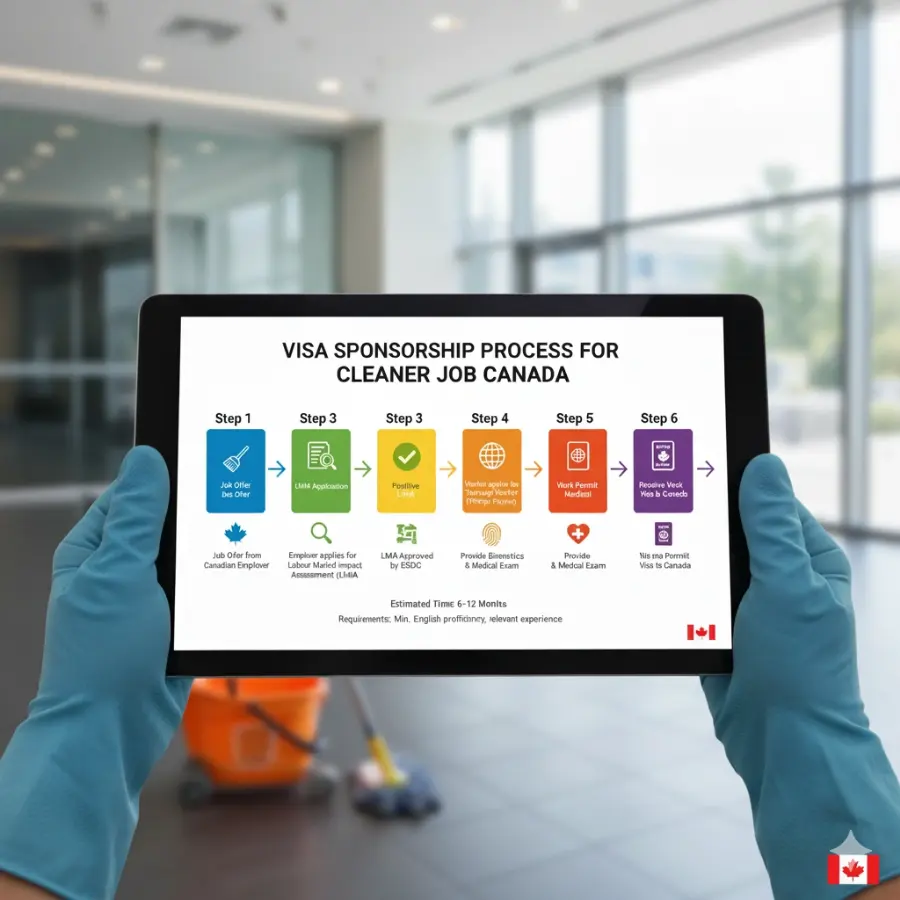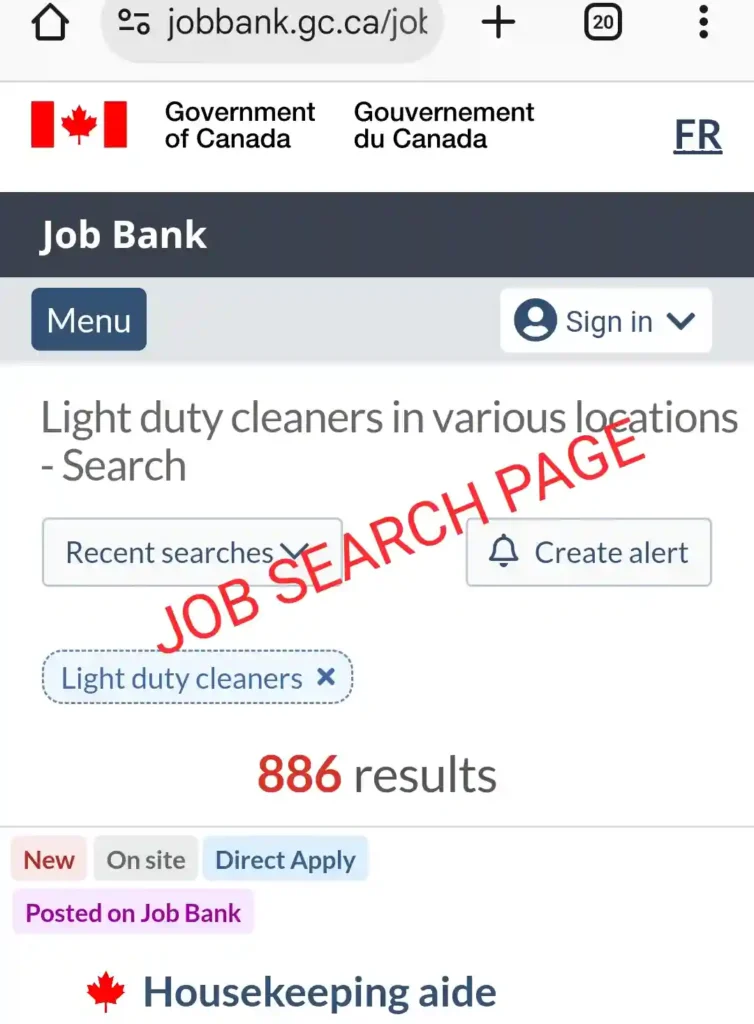Finding a job abroad can feel hard, but cleaner jobs in Canada are one of the more common ways foreigners can work there. Cleaners do important work: they keep homes, hotels, offices, and factories tidy and safe. Many Canadian employers hire cleaners from inside Canada, but sometimes they cannot find enough local workers. When that happens, an employer may hire a foreign worker and give them visa sponsorship (this helps the worker get a legal work permit).
This guide will walk you step-by-step. You will learn what kinds of cleaner jobs exist, how much cleaners usually earn, what “visa sponsorship” really means, and the main programs employers use to hire foreign cleaners. I will also show the documents you must prepare and give real job websites where you can search and apply. If you want practical advice and a simple plan to follow, this article is for you. Read slowly, note the steps, and use the job links at the end.
By the end, you will know how to look for cleaner jobs in Canada and what to expect if an employer offers visa sponsorship.
Why Employers Need Foreign Cleaners in Canada
Many people wonder why Canada needs foreign cleaners even though there are Canadians who can do the job. The truth is that foreign cleaners play an important role in Canada’s workforce, and employers hire them for several reasons:
1. ✅ Labour Shortage
- Canada is facing a shortage of workers in many industries, including cleaning and maintenance.
- Many Canadians prefer higher-paying or office-based jobs, leaving cleaning roles unfilled.
- Foreign cleaners help fill this gap so businesses can keep running smoothly.
2. ✅ High Demand for Cleaning Services
- Canada has a growing population, more office spaces, schools, hospitals, hotels, and restaurants.
- This creates a constant need for cleaners, but the local workforce is not enough to meet the demand.
- Employers hire foreign cleaners to keep up with this demand.
3. ✅ Reliability and Dedication
- Many employers find that foreign workers are hardworking, dedicated, and willing to take jobs that locals often avoid.
- Foreign cleaners usually take their work seriously because they value the opportunity to work in Canada.
4. ✅ Support for Essential Sectors
- Hospitals, hotels, schools, and public buildings need constant cleaning.
- Foreign cleaners ensure these essential services are maintained, which helps the economy and public health.
5. ✅ Visa Sponsorship Programs
- The Canadian government allows employers to bring in foreign workers through programs like the Temporary Foreign Worker Program (TFWP).
- Employers who cannot find enough local cleaners can legally hire foreigners and sponsor their visas.
6. ✅ Affordable and Stable Workforce
- Hiring foreign cleaners gives employers access to a more stable workforce since many are ready to stay long-term.
- This reduces high turnover rates, which are common when hiring local workers who may quit quickly.
7. ✅ Cultural Diversity
- Foreign cleaners bring diversity to Canadian workplaces.
- Employers benefit from different cultural perspectives and work ethics, which make the work environment richer and more dynamic.
What Kinds Of Cleaner Jobs Are Available In Canada
Cleaning jobs come in many places and types. The main ones are:
- Housekeeper / Home cleaner — cleans private houses and apartments.
- Hotel room attendant / Housekeeping attendant — cleans hotel rooms and public areas.
- Janitor / Custodian — cleans schools, offices, malls, and buildings.
- Commercial cleaner / Office cleaner — daytime or after-hours cleaning for offices.
- Industrial cleaner / Factory cleaner — cleans factories, warehouses, and heavy equipment.
- Specialty cleaner — e.g., carpet cleaning, window cleaning, biohazard cleaning (may need training).
- These roles can be full-time, part-time, contract, or seasonal (for tourism areas). Job Bank (Canada’s official job board) lists many light-duty cleaner and housekeeper openings across provinces.

What “Visa Sponsorship” Means
Visa sponsorship means an employer in Canada supports your application for a work permit. In practical terms:
- The employer proves they want to hire you and, in many cases, that no qualified Canadian worker is available.
- The employer may apply for a Labour Market Impact Assessment (LMIA). A positive LMIA helps you get a work permit.
- Sometimes employers can hire without an LMIA under special rules (called the International Mobility Program) — but the employer still must submit an offer and do some paperwork.
So, visa sponsorship is the employer’s commitment and paperwork that lets you apply for a legal work permit. It does not guarantee permanent residence — it is mainly for a temporary work permit unless the employer later helps with permanent status.
Ways Employers Hire Foreign Cleaners
1. ✅ Temporary Foreign Worker Program (TFWP) + LMIA
Most employers who want to hire foreign cleaners use the Temporary Foreign Worker Program. They must usually get a positive LMIA from Employment and Social Development Canada (ESDC). The LMIA shows that hiring a foreign worker will not hurt Canadian workers and that recruitment efforts were made. Once the employer gets a positive LMIA, you can apply for a work permit.
2. ✅ International Mobility Program (IMP) — LMIA-exempt
Some hires are LMIA-exempt (for example, intra-company transfers, some public policy categories). Employers still must submit an offer of employment and pay a compliance fee. This is less common for basic cleaner roles but possible in certain cases.
3. ✅ Caregiver & other special programs
Historically, caregivers and some support worker streams had special pathways. Cleaners are usually NOC skill level C/D roles and not often eligible for skilled immigration programs, but some provincial or employer-specific routes may exist. Always check the specific program rules.
Salary Table for for Cleaner Jobs in Canada
Below is a simple table showing typical pay ranges in Canada (hourly and approximate annual), using recent job boards and salary sites as sources. Wages vary by province, city, employer, and experience.
| Job title | Typical hourly pay (CAD) | Approx. yearly (full-time) | Notes / source |
|---|---|---|---|
| Housekeeper / Hotel room attendant | $15 – $22 / hour | $28,000 – $45,000 | Hotel housekeeping ranges shown on Job Bank and Glassdor or indeed |
| Cleaner / Janitor (office, school) | $14 – $20 / hour | $27,000 – $40,000 | Many janitor postings on Job Bank and Indeed. |
| Commercial cleaner (contract) | $14 – $23 / hour | $27,000 – $47,000 | Depends on contract and shift (night shift often pays more). |
| Industrial cleaner / Factory cleaner | $16 – $25 / hour | $32,000 – $52,000 | Some roles pay higher for hazardous or certified cleaning. |
| Cleaning supervisor / Housekeeping manager | $18 – $32 / hour | $37,000 – $66,000 | Supervisory roles in hotels/resorts pay higher. |
What you should know about Payment: These are general ranges. Big cities (Toronto, Vancouver) often pay more but cost of living is higher. Job Bank and Glassdoor provide live listings and reported salaries.
Step By Step: How To Find And Apply for Cleaner Jobs with Sponsorship
Step 1 — Prepare A Simple CV (resume)
- Keep it short (1 page if possible).
- Include: full name, contact info, short objective (1–2 lines), work experience (job title, employer, dates, tasks), skills (cleaning, equipment, safety), and at least 1–2 references.
- Mention language ability (English/French) and any certifications (e.g., WHMIS, food safety, first aid).
Step 2 — Search The Right Job Sites
Use Job Bank (official website), Indeed, LinkedIn, Glassdoor, and local provincial boards. Job Bank often shows jobs that can connect to employers who do LMIA-based hiring.
Step 3 — Apply And Be Clear In Your Message
When you apply, say you are willing to work legally and ask if they sponsor foreign workers or assist with LMIA. (Sample message below.)
Step 4 — If Employer Offers Sponsorship
- Employer may request information to start LMIA or Employer Portal process.
- The employer should explain who pays for the LMIA fees and recruitment costs — note: employers are expected to pay most required fees (they cannot normally force you to pay LMIA fees).
Step 5 — Apply For A Work Permit
With a positive LMIA (or employer offer number if LMIA-exempt), you apply for a Canadian work permit through IRCC. Follow IRCC guide and include documents the employer provides.
6 — Documents You Will Need (for job & for work permit)
For job application
- CV / resume
- Passport bio page (scan) — handy to show employer you can travel
- Work references or letters from former employers
- Police check (if employer asks)
- Any cleaning or safety certificates (if available)
For Work Permit Application
- Valid passport
- Job offer letter from employer
- Positive LMIA letter (if required) OR Employer offer number for LMIA-exempt hires.
- Proof of work experience (reference letters, pay slips)
- Medical exam (if job needs it)
- Police/police clearance (if requested)
Make sure to check the exact list from IRCC when you apply. The IRCC guide gives detailed steps for applying for a work permit from outside Canada.
How To Get Job very Fast
If you a foreigner that urgently need a cleaning job in Canada ASAP, do not just apply and stay idle, do below things:-
Apply widely. Send applications to many employers and use job alerts. Job Bank and Indeed let you save searches.
Be honest. Don’t fake experience. Employers check references.
Learn basic English (or French). Even a little language skill helps in interviews and daily work.
Get simple certifications if possible (WHMIS, workplace safety, food handling). These are inexpensive and look good on a CV.
Offer flexible availability. Night shifts and weekends are often in demand.
Have ready references and quick copies of your passport and any required documents. This speeds up hiring and LMIA processes.
Things You Should Avoid
- Trusting a job that asks you to pay large upfront fees for “visa processing” — legitimate employers do not usually ask applicants to pay LMIA fees. Be careful of scams.
- Applying only to one province or one employer. Broaden your search.
- Not checking the official paperwork. Always ask the employer to show LMIA or offer number before you pay or travel.
- Using unofficial recruiters that promise guaranteed LMIA — always verify the recruiter and employer.
Where To Search — Best Job Sites And How To Use Them
These sites are commonly used by employers and by job seekers:
- Job Bank (Government of Canada) — official job listings and good for seeing real employer postings and wage ranges. Use it to find local vacancies and live wages. — goto www.jobbank.gc.ca/

- Indeed Canada — large board with many cleaning jobs; filters for “visa sponsorship” appear sometimes — goto www.ca.indeed.com
- LinkedIn — good for connecting with employers and recruiters; sometimes posts list LMIA or sponsorship
- Glassdoor — good for salary ranges and employer reviews.
- Provincial job boards — some provinces have local boards or hospitality groups (search for the province + “job bank” or “hospitality jobs”).
How to use them: Create alerts for keywords like “housekeeper”, “hotel housekeeping”, “janitor”, “light duty cleaner”, and include location “Canada” or target city. Apply quickly and follow the job posting instructions (email vs apply online).
Sample Short Message / Email To Send To Employers
Use this template to write application letter or when messaging an employer or responding to a job post:
Subject: Cleaner / Housekeeper application — [Your Name]
Hello [Employer name],
My name is [Your Name]. I have [X] years experience as a [housekeeper / cleaner / janitor]. I can do hotel room cleaning, floor care, waste removal, and basic maintenance. I speak [English level, e.g., “basic English”]. I am ready to start work and can provide references.
Do you hire foreign workers or provide visa sponsorship / LMIA support? I can send my resume and documents if you would like.
Thank you for your time.
[Your phone or WhatsApp] | [Email]
Short, polite, and direct. If they answer, ask details about sponsorship and who pays fees
Conclusion
Cleaner jobs in Canada are commonly available across provinces. Employers sometimes hire foreign cleaners when they cannot find local workers. Visa sponsorship usually involves the employer getting a positive LMIA or using an LMIA-exempt route, then you apply for a work permit. Pay varies by job and location but is often between $14–$23 per hour for many cleaner roles, with supervisors earning more. Use official sources like Job Bank and IRCC for reliable steps, prepare a clear CV, apply widely, and be careful of scams that ask for big upfront fees. With patience and persistence, you can find a legitimate cleaning job and the employer who will support your work permit. — Start Application Here
(Important: rules and wage thresholds change from time to time — always check official Canada government pages for the latest LMIA and TFWP rules before you apply.)
Frequently Asked Questions (FAQs)
Q1: Do cleaning jobs lead to permanent residence in Canada?
A: Usually cleaner jobs are temporary work. Some pathways to permanent residence exist for lower-skill workers via provincial or federal programs, but options are limited and change often. If the employer can offer a long-term job, you may later be eligible for a PR program — check with IRCC or a licensed immigration adviser.
Q2: Will the employer pay for my LMIA fees?
A: Employers are generally expected to cover recruitment and LMIA-related obligations. You should clarify this with any employer who offers sponsorship. Some online services wrongly tell applicants to pay for employer fees—be cautious.
Q3: How long does the LMIA process take?
A: Processing times vary. ESDC publishes service standards; high-wage or expedited categories can be faster. Always ask the employer for expected timelines.
Q4: Can I apply directly for a Canadian work permit without an employer?
A: To work legally you usually need a job offer. Some programs (e.g., Express Entry) let skilled workers apply for PR without a specific employer, but most cleaner roles are not in the “skilled” categories used by Express Entry. Check IRCC pages for details.
Q5: Are there scams I should watch out for?
A: Yes. Be wary of jobs that ask for money first, promise guaranteed visas, or offer jobs that don’t match real employer details. Use official sources and verify the employer (company website, Job Bank posting, phone number). If something feels wrong, don’t pay money.
